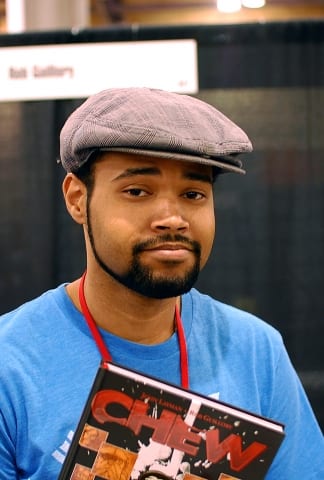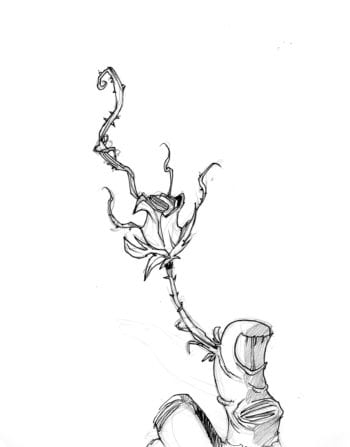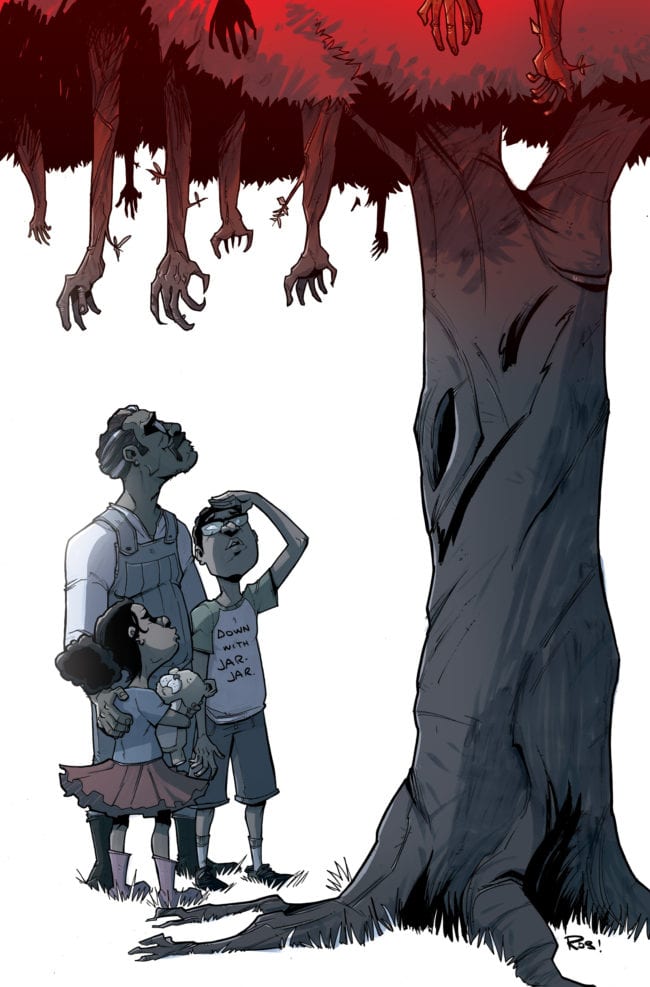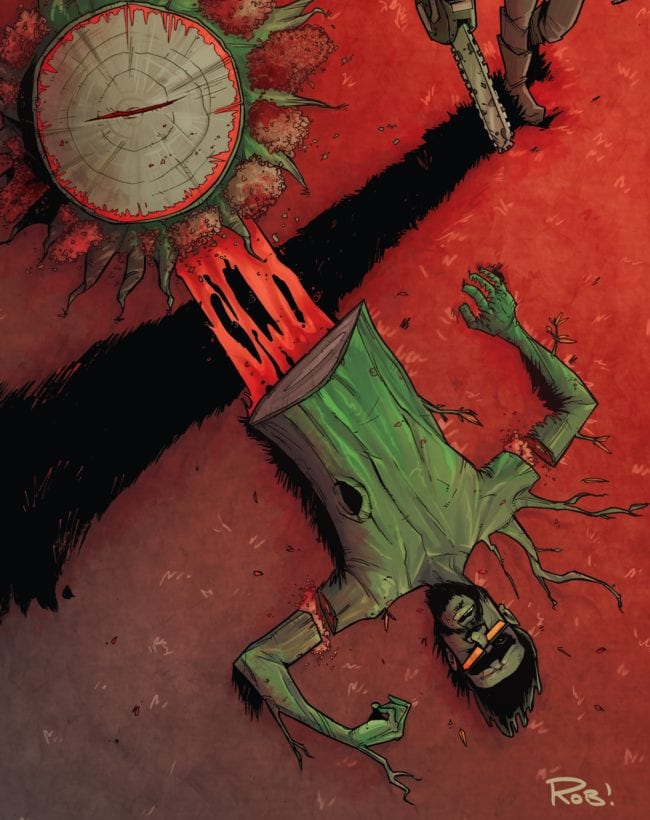 Like a lot of readers, I was fascinated by the high concept behind Chew when it launched in 2009, but what’s stayed with me about the series long after is the work of the book’s artist/colorist Rob Guillory. His non-realistic style and his sense of composition helped the book by grounding the absurdity and craziness of the plot – often while simultaneously crafting visual and sight gags to amp up the craziness in interesting ways.
Like a lot of readers, I was fascinated by the high concept behind Chew when it launched in 2009, but what’s stayed with me about the series long after is the work of the book’s artist/colorist Rob Guillory. His non-realistic style and his sense of composition helped the book by grounding the absurdity and craziness of the plot – often while simultaneously crafting visual and sight gags to amp up the craziness in interesting ways.
His new project is Farmhand, an ongoing series from Image Comics that he’s writing and drawing. The high concept is about a farmer who has a vision of a new type of stem cell which transforms bioengineering as Jedidiah Jenkins becomes a “body farmer,” growing organs to replace those that people lose. Unlike Chew the book has a very different tone and pace, slower and more deliberate. This is a book about family and history and for all the craziness of limbs growing from trees, it’s a much more personal book about fathers and sons, raising children and confronting the past. Guillory opened up about how he works and the origins of the crazy story. - Alex Dueben
Alex Dueben: Where did Farmhand start?
Rob Guillory: Well, the initial concept emerged in January 2016. Our eight-year run on Chew was coming to a close, and I was starting to brainstorm my next project. The concept hit me first as a single image of a tree with human limbs growing from it. And the hook immediately formed: An organic farmer that grows human organs. From there, a much richer narrative began to take form, and here we are. But oddly enough, after I was already a year into working on Farmhand, my wife reminded me that my senior art thesis from 2005 featured a series of paintings of humans as plants. I’d completely forgotten that. So apparently, I’d been percolating on this idea much, much longer than I originally realized.
Had you written much before this?
Pre-Chew, I wrote most of my own projects. None of them ever saw the light of day, but I was actually starting to develop a new solo pitch when Chew was offered to me. So this is a full-circle moment for me. I’d always intended to come back to writing, and Farmhand is the first fruits of this return home. But now I have this 60+ issue epic behind me that’s opened a lot of doors for me to trumpet my work.
After finishing Chew, I'm sure you had offers, you had options, but you wanted to write and draw a comic and make your own thing. Why?
I just didn’t care about doing anything else, to be honest. Sure, doing something for Marvel or DC sounded nice on paper, but Farmhand was the only story I had real love for. I got a few offers that paid well, and that’s a blessing. But moving into this new phase of my career as writer/artist seemed right for me. It was really nerve-wracking because I’ve found that writing requires a deeper vulnerability on my part than just drawing a story, and that’s a bit intimidating. With Chew, I was happy to play the background and be the silent partner of the team. With Farmhand, I’m front and center, having to share what’s really going on in my head. It’s daunting, but it’s been the most fulfilling thing I’ve ever done.
 People will read this and they'll quickly see that the pacing, the tone is very different from Chew. Were you thinking about this when you were working on the book?
People will read this and they'll quickly see that the pacing, the tone is very different from Chew. Were you thinking about this when you were working on the book?
I knew that I wanted to tell a slower, more grounded story, so that naturally made Farmhand a different beast. Chew was spastic, goofy and madcap. But Farmhand is more cerebral, grounded in a small town Southern locale. I’ve always loved the Watchmen/Lost style of character deconstruction, so I wanted each issue to be a day in the life of one of an ensemble cast of interesting characters. I wanted it to be foreboding and outright scary at times, while still somehow retaining an element of fun. And yeah, I wanted it to be a family drama, as our family had grown to a party of five during Chew’s run, and family was at the forefront of my mind. So when I put all these pieces together, it was naturally its own thing. It’s a very dynamic title from the first issue.
I would argue that the first scene, which not to spoil too much is a dream, feels like Chew in a number of ways. There is a perfect story reason for it, but it is a way to ease readers into this story in a sense.
That was sort of deliberate as well. I wanted to segueway readers from the kind of story they’re used to getting from me to this new story that’s a bit different than anything I’ve done. Even using chickens [in that scene] was deliberate, as chicken played a huge part in the story of Chew. I wanted to give a nod to the past, before leading in to this new future.
Are you a fan of body horror, and David Cronenberg, and that kind of work?
I’m actually not a huge horror fan. I was exposed to WAY too much horror at a young age, and it definitely left a mark. I grew up with things like The Fly, Psycho, Friday the 13th and Halloween, and I think I’ve always struggled with fear as a result. But it made me realize that horror can be a powerful tool when wielded properly. And that’s sort of what I’m trying to do with Farmhand. It’s not scary just for the sake of being scary. There are some things, in this comic and in life, that are worthy of our fear and trembling. And oftentimes, the scariest things of all are the unplanned repercussions of our actions. What makes the Frankenstein monster so frightening isn’t just that it’s a monster. It’s the fact that we made it with our own hands and with the best of intentions. Now it’s totally out of our control. That’s what I’m exploring here.
 I'm curious about your influences on this book. What were you thinking about as far as tone, approach, style. Does this represent the kinds of stories you like to read/watch?
I'm curious about your influences on this book. What were you thinking about as far as tone, approach, style. Does this represent the kinds of stories you like to read/watch?
I was definitely drawing from stuff like Watchmen, Stephen King and Rod Serling, among a few others. I tend to like a good character drama with a dark edge. I was a pretty huge Hitchcock fan growing up, so I think there’s some of that in Farmhand as well. I love when stories are start off rooted in mundane life, only to reveal a dark underbelly.
Was there anything that you can point to that you learned from John Layman and making Chew about the rhythms and approach when it comes to writing a longform comic?
Oh, absolutely. Layman’s a master storyteller, and sitting under someone like him for eight years, you can’t help but learn a thing or two. I learned a lot about plotting a long story without crippling yourself with detail. I learned how to feel the movement and momentum of an issue. Most importantly, I learned that sometimes you just have to take the risk, throw crap against the wall and hope it sticks. For a perfectionist like me, who has had to learn to fail well, that’s huge.
Can you talk a little about how having issues play out over a single day plays into the pacing and feel you're trying to achieve. Because that's a choice we see in TV sometimes, but not often in comics.
Yeah, I think I’m drawing more from TV than comics here. And my brain just works that way, I suppose. Not every issue of Farmhand will use this “day in the life” method, though. I just found it as a useful way to get to know these characters. You can learn a lot about a person by hanging out with them all day.
How are you working on Farmhand?
I’m doing full scripts with dialogue and panel breakdowns. I wanted to write as if I was writing for a different artist. And because I tend to write months before I ever draw an issue, by the time I begin drawing an issue, it’s like I’m drawing for a different writer. I often pick up my scripts months after finishing them, having forgotten a lot of the details I put in. It’s a lot of fun. I give myself freedom to edit scripts on the fly as I draw them, if needed. It’s pretty organic, but structured.
Why do you write like that?
Well, I’m actually not good at multitasking. I do one thing at a time, even when it comes to creative duties. So if I’m writing, I’m writing a bunch of scripts at a time, over the course of a few months. That’s how I wrote the first arc of Farmhand. I created a space where all I really did for 2-3 months was live in this world, and it wasn’t until I finished the last script that I began drawing it. I can’t say if that’s the most efficient way to script, and maybe that’ll change over time, but that’s what worked for me.
During those few months were you writing the scripts for the first story arc? Were you outlining the entire series?
I wanted to script the entire first story arc before I started drawing anything. I was also working out a rough outline for the entire series at the same time. Nothing super-detailed. I just wanted a story skeleton that was solid enough to give me the shape of the story without shackling me to too much intense detail. I wanted the freedom to be able to move things around if new ideas popped up that I wanted to incorporate.
 And you weren’t drawing at all during that time?
And you weren’t drawing at all during that time?
I think I scribbled a few rough sketches of page layouts and characters here and there during that time, but very little. But you have to understand, I was just coming off eight years of drawing a monthly-ish book. I think there was a part of me that wanted a bit of a separation from what I’d done before. Those months of doing nothing but writing Farmhand were sort of a “three days in the tomb before resurrection” experience for me, as weird as it may sound. I was really wrestling with the whirlwind that was my Chew years, the fact that this segment of my life was now over, and the fact that I was starting this whole new phase of my career. When I picked up the pencil for Farmhand, I wanted to go to it with new eyes and a fresh perspective.
What do you think that enabled you to do? Was this just the equivalent of writers who put a draft in a drawer and walk away for a bit before editing? Is your plan to do this, or something similar, for each story arc?
I think I needed the distance from my work. Working solo as a writer/artist, I don’t have the luxury of having that creative partner to bounce things off of. It’s just me, my wife, and the few trusted friends I occasionally show these early scripts off to. So some of this was just me trying to get far enough from my work to see if it’s any good. And some of it was just me wanting the peace of mind that comes with having a bunch of scripts in the can. Honestly, in a perfect world, I would’ve loved to have finished the entire story before drawing one page. But that just isn’t realistic.
At the moment, I’m planning to wrap issue 5 inks by mid-July, shortly after issue 1 debuts. From there, I’m locking myself away to script the whole second arc. I think it’ll go a good bit faster than the first arc, since I’ve already set a lot of story points in motion by now, and I’ve already started a good bit of it. We’ll see.
So you had the script for the first story arc, you know where the book is going. Then what? How do you lay out pages and break down space?
From there, I go right into drawing the entire issue as thumbnails. When I look at a page of script, I’m immediately weighing which images need to be bigger, and which ones work best smaller. I see which operate better as a sequence of repeated panels, and which work better as isolated images. From there, I sketch out a rough layout of the panels, with no details other than where each panel would go. It’s sort of a jigsaw puzzle, I suppose. Very simple by design, as I’m more focused on clean, easy-to-follow storytelling than anything else. I don’t think my layouts are very fancy at all. They’re simple, but effective.
Once I’ve gotten the space broken up, I quickly pencil in a tiny sketch of each panel, focusing on figures, general background elements and whatever else is prominent. Not a lot of detail. I’m mostly focusing on layout and how the images flow through the page. When that’s finished, I rough pencil the sketch on 11x17 bristol board with a dull red checking pencil. It’s dull on purpose, because I don’t want to focus on detail at this stage. I just want to lay out the broad strokes of the page as fast as I can. Then I add detail using a mechanical pencil filled with red graphite. The red pencil operates similar to a no-repro blue pencil. Doesn’t show up in scans, but it’s easier to see than the blue pencil.
After pencils are done, I ink everything using an assortment of brush and pen. I can pencil and ink about a page per day.
 You’re not coloring Farmhand. Taylor Wells who was your color assistant on Chew is. Why? And after years of coloring your own work, what has this been like?
You’re not coloring Farmhand. Taylor Wells who was your color assistant on Chew is. Why? And after years of coloring your own work, what has this been like?
I just knew I couldn’t handle it all alone, not with the added writing duties. Taylor’s worked with me for 40+ issues of Chew, so there was no one more familiar with my art than her. And it’s been an incredible experience. She knows what works best with my art, bringing her own unique voice to it, while somehow maintaining my artistic fingerprint. It’s been a phenomenal collaboration, and I wouldn’t want to do it without her.
Is there anything that Taylor has does with colors in this book that surprised you when you saw them? This book has a different tone and palate but are you two working together in a similar way?
She’s constantly surprising me, honestly. I remember when she sent me the first issue cover last year, and I was immediately taken aback by her color choices. Particularly I was struck by the color of the sky. I’d never have made the sky that color, but it was perfect. She just uses colors in ways that I would never think of. Our process for this is totally different than it was on Chew. I send her the inks, sometimes with a few notes like “This takes place in a crappy bar, so I was thinking a lot of orange here”. Just general thoughts about color schemes that she can ignore if she has a better idea. And she usually does.
In his introduction to Tim Fielder’s graphic novel Matty’s Rocket, the artist John Jennings wrote: “My work as a scholar is connected to the future; the Afro-Future. Historically, the South has been deemed “haunted” and even indexed directly to a dark and horrible past; especially for folks of color. The people I tell my origins to don’t realize that the idea for a black American future started in the South and that the longing for a better life forced people to manifest their dreams into reality. Mississippi is space where dreams grow in tandem with the cotton.” I know that you were born and raised in Louisiana and still live there; what does it mean to you both as the setting of the book and just in terms of your life?
That’s a fantastic question. I think the South is a hell of a paradox. On one hand, it’s Ground Zero for unspeakable horrors against humanity that still haunt us today. But at the same time, I think it’s Ground Zero for a deep level of healing and reconciliation that we will need in our future. The same place that once was the home of the Klan was also the home of abolitionists and freed men of color that fought back the Klan’s influence with pitchforks and fists. It’s an insane picture of pain and progress. It’s also a very human picture at the very heart of Farmhand. The South, much like Farmhand, much like all humanity, lives in the shadow of a curse passed down from generations past. The question I’m interested in asking in Farmhand is “How can we walk out of that shadow into the light?” I knew folks will look at Farmhand as a horror book, but there’s actually a hopeful tale of reconciliation that I’m trying to tell here. We’ve just got to go through the dark stuff first to get there.
Related to that, body horror is very much about death and we're both in our thirties and part of being a parent and a child at this age is confronting fear and change and death and illness – essentially all of these concerns and ideas and elements of the book dovetail into each other.
Absolutely. Particularly, there’s a lot of coping with the present while coping with the past here. Ezekiel in particular represents this struggle. He wants to move forward as a man by first choosing to move back to the place of his childhood, with all the fear and trauma associated with it. Plus he’s got the added stress of his father’s sins rippling into his family’s life. It’s a lot to deal with, but I think it’s a real thing young parents often have to wrestle with. I certainly did.
As a last question I have to ask, are you a gardener?
Barely! My wife and I have had a few gardens over the years, but we shelved them while we were having our kids. We just didn’t have the time to fight off garden pests in between changing diapers. But now that they’re getting a bit older, I could see us making another go of it. I just really appreciate being able to enjoy the fruit of my labors, whether in my garden or in my comic work. It’s a special kind of fulfillment. I have romantic visions of myself gardening, but that may have to wait until my life slows down a bit.







